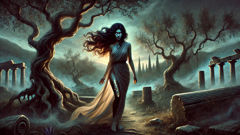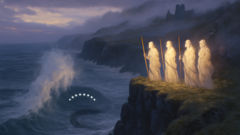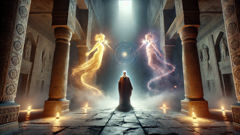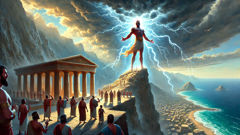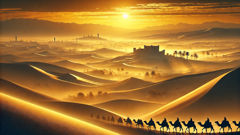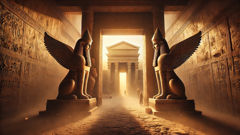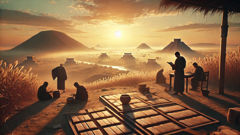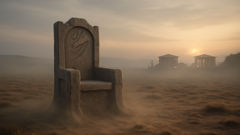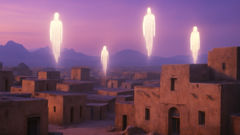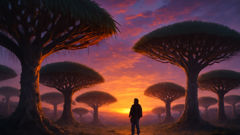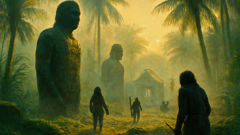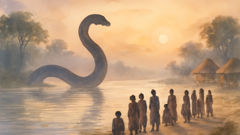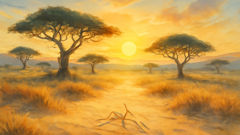Introduction
Wind from the great deserts sweeps across cracked stone, carrying the echo of offerings once poured at doors of ruined temples. In this land, where the riverbeds hold the memory of floods and the winds remember the names of the ancient kings, Mot does not merely exist. He rises like a dry season made flesh, a weight in the lungs of the earth, a hush before the next breath. The story of Mot is not only a fearsome fable about death; it is a ledger of balance. Life and death stand at the edge of many plains — the fields, the orchards, the households that barter bread for rain. Baal, god of life and fertility, strides through the storm-wracked hills with a crown of clouds and a staff that brings fruit from barren soil. He and Mot meet in a landscape that has learned to hold its breath: a desert plateau at the edge of a ruined temple, where banners of blue and gold are the only color left to tell a story. This epic begins with a drought that gnaws at the roots of fig trees and a smell of resin and stone in the air. The gods watch, silent as the night. The people pray, not to escape death, but to learn its language and find a way to weather what seems endless. In these pages, you will hear their voices, see their shadows stretched across stone, smell the dust that clings to robes and sandals, and feel the moment when the world tilts toward either renewal or oblivion. The confrontation between Mot and Baal is not a single clash but a long hinge in which the future of crops, rain, and children's laughter hinges on a choice they must make. It is a story that travels beyond myth into memory, reminding us that every season asks a question: will life endure if death is not answered?
Section I — The Call of Dusk: Mot's Emergence
The earth remembers the names of the dead differently than the living do, and in this memory Mot stalks the plain. He does not announce himself with a trumpet blast or a drumbeat. He arrives as a lowering of the air, a chill that climbs the spine of every animal and human who has learned to listen. In the ancient world the dead are not far away; they are the archive of soil, a river that runs beneath the feet of farmers and priests. Mot rises from the fissures of the earth like a tide of mineral dusk, a slow current that reshapes the ground as if turning a page. He is not a mere absence but a presence that asks a question with every breath: what happens to a life when its season ends? The drought is his herald. The leaves curl, the fruit withers, the bread tastes of ash, and a particular quiet settles over wells and altars. It is at this moment that the chief priests of the temple begin to speak Mot’s name with a shiver, not in fear alone but in the ritual acknowledgment that death is a force that must be fed as surely as corn is fed to the loom. Mot’s world is the underland that stretches out beyond the river and the orchard, the place where bones lie in a patient mercy and where rivers once ran but now only remember to wait. In the hills, the priests argue about rites that can coax the earth into giving back its pace, and the common folk debate what it means to be alive when the air itself feels like a held breath. Mot enters not as a shadow but as a decree. He travels in a cloak of dust and a belt of dried seeds, and wherever his feet touch, the ground keeps a clock. He speaks in a language older than speech—the quiet, the pause, the sense that something final has been named and cannot be unspoken. The season therefore stirs to listen, and the people tilt their faces toward the horizon where the mountain passes spill into the plain. In this first movement, Mot is not yet a conqueror so much as a test. He challenges the courage of the living, the vow of the priests, and the simple faith that rain will come if the gods are obeyed. Yet even in his arrival the memory of life clings to him: seeds lie in the soil, a child’s lullaby haunts the tents, and the stubborn hope that the land will remember how to bloom remains. The narrative of Mot’s emergence is a reminder that death is not merely a force to fear, but a force that asks for a witness, a reckoning, and a response. The people will answer not with swords alone but with songs, with harvest rituals, and with the stubborn mercy of daylight after the night.
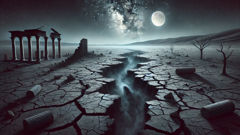
Section II — The Covenant of Rain: Baal's Return
Baal is not merely a god of rain; he is the negotiator of life, the storm-maker who can coax green from stone if given a price that the earth is willing to pay. When Mot’s chorus of drought gathers like a field of sharpened knives, Baal steps forward with a different music in his lungs. He speaks in the cadence of thunder and the language of trees that bend toward light. To confront Mot, Baal does not bring a sword; he brings a breath, a vow, and a circle of promises that link the present to the future. The storm returns in a fragile, patient way, as if it were testing the soil’s receptivity. Baal walks through the cedar groves that cling to the hillside, each needle of evergreen a tiny green interrupting the gray. He speaks to rivers that have thinned to a thread and to the women who grind grain and watch the horizon for the first line of rain on the edge of the dust. The negotiations by which life is re-secured are not neat or simple. They are an exchange in which every grain of wheat, every olive leaf, every barrel of wine from the temple stores, becomes currency. Mot answers not with boasts but with the patience of the underworld, the sense that life is a flame that can be fed with careful gifts of time. The gods test the strength of human memory: can the people recall the names of their ancestors when the night returns, can they recite the rites without the fear that paralyzes the hand? Baal’s return is not a single moment but a season of acts. He gathers priests, farmers, and storytellers into a circle and requires them to recite the old songs that call the rain to walk again through the valleys. The first raindrops are shy, the soil drinking with a whisper, and yet the land begins to listen. As the clouds tilt and the wind shifts, the earth remembers the forest that once stood behind the temple and the vines that climbed the ruin’s walls. In this second movement the cosmos audits the balance between life and death: without Mot there is no value to the harvest; without Baal there is no memory of renewal. The interruption of drought is not a miracle but a covenant sealed with ritual, patience, and the stubborn courage of the people who live by the rhythm of seasons. The end of this section leaves Mot and Baal in the same arena, their powers steeled by the same need: to answer every question with a price that reality can bear. Rain has begun as a rumor, but it is a rumor the world can learn to trust, if only the gods and mortals together keep faith with the land.
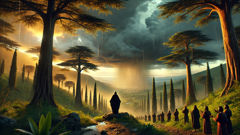
Conclusion
The land survives not by the strength of one god against another, but by the stubborn harmonies humans perform every season. Mot recedes into the earth’s memory, yet his sighs linger in the dry brush and the bones of the riverbeds, reminding all that decay is not a breaking but a turn in a larger cycle. Baal holds the line with the first deep breaths of rain, the fields drinking in long rows of light, the children learning to count the drops. The people carry their rituals forward like seeds in a well-told story, knowing that a single drought can crack the world unless memory, ritual, and care hold hands around it. When the sky finally opens, it does so with a patient mercy: not a flood but a green renewal, not a sudden miracle but a careful agreement between living and dying. In the end, the myth of Mot and Baal teaches a practical wisdom: life persists when communities honor the limits of mortality while opening themselves to the resilience that rain, soil, and shared endurance can offer. The gates of the temple are rebuilt, the fields recover their old laughter, and every harvest becomes a small oath that life will not surrender to oblivion. The story closes with a quiet, inexhaustible truth: death is not the end of the story, only a chapter that must be faced so life can continue to write new ones.


